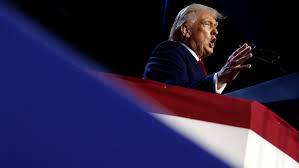Kremlin: Putin Has No Plans to Congratulate Trump
In a surprising turn of events, the Kremlin has announced that Russian President Vladimir Putin has no immediate plans to congratulate Donald Trump on his victory in the 2024 U.S. Presidential Election. This statement, issued by Russian officials shortly after Trump was declared the winner, has raised eyebrows among international observers, who have closely followed the complex relationship between the two leaders during Trump’s previous term in office.
While Putin and Trump have been known for their unorthodox rapport, the Kremlin’s response highlights the deepening geopolitical tensions between the U.S. and Russia, especially as Moscow faces increasing isolation due to its actions in Ukraine and its strained relationships with Western powers. The lack of a congratulatory message signals a shift in Russia’s diplomatic posture, as Putin weighs his next steps in relation to U.S. foreign policy under Trump’s potential second term.
Putin’s Calculations: A Shifting Geopolitical Landscape
The Kremlin's decision not to extend congratulations to Trump suggests that Putin may be recalibrating his strategy towards the United States. During Trump’s first presidency, Russia enjoyed some degree of diplomatic flexibility, particularly in areas such as arms control and foreign policy. Trump was often seen as a more favorable figure to Moscow due to his more isolationist and "America First" policies, which, at times, seemed to undermine U.S. commitments to NATO and European alliances. However, despite the warm rhetoric between the two leaders, Putin’s government was cautious about fully embracing Trump due to the unpredictability of his policies.
Now, with Trump’s return to power, the dynamics of U.S.-Russia relations are far more complicated. According to analysts, Russia’s failure to congratulate Trump immediately could be a reflection of Moscow’s uncertainty over how the new administration will navigate crucial issues like sanctions, NATO expansion, and the ongoing conflict in Ukraine.
“The lack of a congratulatory message is significant,†said Maria Snegovaya, a Russia expert at the Atlantic Council. “Putin’s position reflects a more cautious approach. Russia knows that Trump’s rhetoric may not always align with his actions, and they are wary of committing to a strategy that could backfire.â€
The Ukraine Factor: A Stumbling Block
One of the most immediate factors influencing Russia's decision not to congratulate Trump is the ongoing war in Ukraine. Since Russia’s invasion in early 2022, U.S. support for Ukraine has remained a central issue in American foreign policy. While Trump has made statements suggesting a willingness to negotiate with Putin, his overall stance on Ukraine and U.S. military aid has been inconsistent, adding another layer of complexity to U.S.-Russia relations.
Under Biden’s administration, the U.S. has been a staunch supporter of Ukraine, imposing heavy sanctions on Russia and providing billions in military and humanitarian aid. Despite Trump’s previous calls to end the conflict through direct talks with Putin, many in the U.S. foreign policy establishment remain skeptical of Trump’s ability—or willingness—to rein in Russia’s aggressive actions. The Kremlin’s hesitancy to acknowledge Trump’s victory could be an attempt to distance itself from any direct responsibility for the war, especially as the situation remains highly volatile.
The Domestic and Global Reactions
Internationally, the absence of a congratulatory message from Russia has been met with a mix of intrigue and concern. For many, it raises questions about how a second Trump presidency would handle Russia’s involvement in global conflicts, cyberattacks, and the future of European security. U.S. allies in Europe, who have often found themselves at odds with Trump’s foreign policy stance, will likely interpret the Kremlin's silence as a sign of caution, awaiting clearer signals from the Trump administration before making any bold moves.
At home, political analysts suggest that Putin’s calculated restraint could be part of a broader strategy to avoid further alienating European nations and the U.S. establishment. By refraining from public praise or congratulations, Russia may be seeking to maintain a level of plausible deniability regarding any involvement in the U.S. electoral process, which has been a recurring point of contention.
What Comes Next?
For Trump, the lack of a congratulatory message from Putin is unlikely to dampen his optimism about his victory or his plans for re-engaging with Russia. Throughout his first term, Trump consistently sought warmer relations with Russia, and many observers expect him to continue pursuing that goal in his second term—though it remains unclear how effective he will be in navigating the delicate balance between diplomacy and domestic concerns over national security.
The lack of immediate acknowledgment from Moscow is more than just a symbolic gesture; it reflects the uncertain future of U.S.-Russia relations and the broader geopolitical challenges facing both nations. As Trump prepares to return to the White House, the world will be watching closely to see whether his foreign policy moves will reassert American dominance or deepen global divides.
In the meantime, the Kremlin’s silence on Trump’s victory suggests that Russia’s future interactions with the U.S. will be shaped by pragmatism and calculation, with Putin likely awaiting clearer signals before fully engaging with the new administration.


